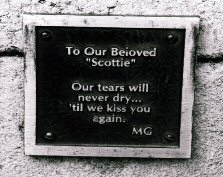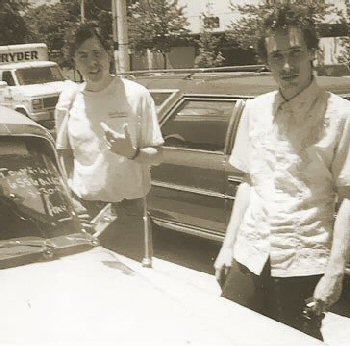
|
|||||
| History | Music | Articles | Gallery | Thoughts | Links |
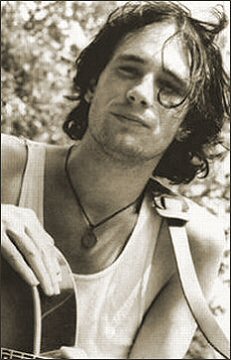
Jeff Buckley 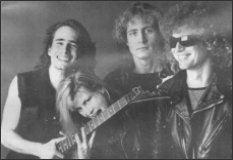
Jeff's first serious band Group Therapy 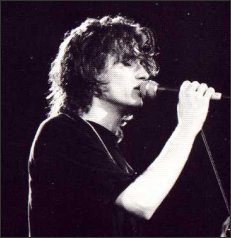
Jeff singing at the 'Greetings From Tim Buckley' exhibition, a tribute concert for his father Tim Buckley that took place at St.Ann's Church, New York, on April 26 1991. 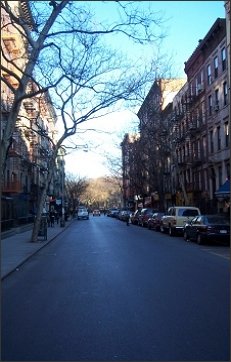
A view down St. Marks Place as of April 2004. Jeff's voice could be heard down this road as he sang in the tiny cofeehouse Sin-é (pronounced shin-ay) in the early 90's. 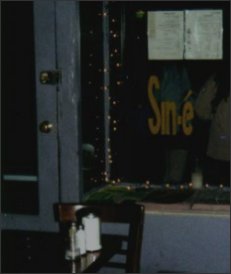
A view of the window looking out of the old Sin-é at 122 St. Marks Place 
Jeff playing at the Postcrypt Cafe Columbia University, New York City where he met his bandmates Mick Grondahl and Matt Johnson 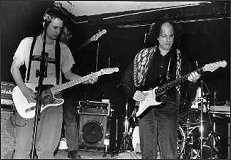
Jeff with Gary Lucas in Gods and Monsters sometime in 1992 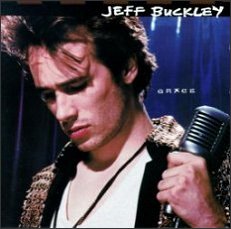
Jeff's first album Grace released in September of 1994 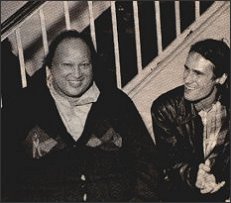
Jeff and his 'Elvis' Nusrat Fateh Ali Khan sometime in 1995 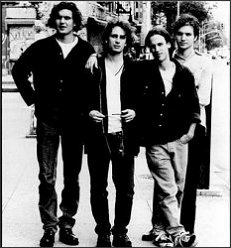
Jeff and his band (Mick Grondahl, Jeff Buckley, Matt Johnson and Michael Tighe) sometime in 1995 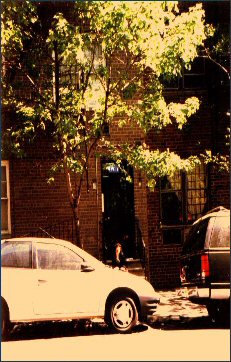 233 East 12th Street
233 East 12th StreetThis is where Jeff Buckley took up residence in New York City. 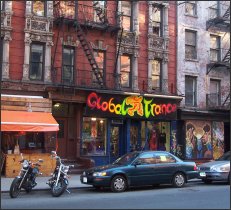
122 St. Marks Place as it stands in April 2004. This was the original location of the coffeehouse Sin-é where Jeff recorded his first EP 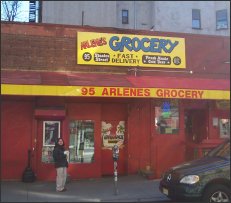
Arlene's Grocery: Jeff played his last gig in New York here with his new band line up featuring Parker Kindred on drums 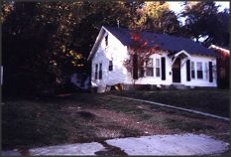
The small house in Memphis where Jeff worked on his unfinished album 'My Sweetheart the Drunk' 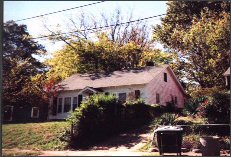
This is another shot of Jeff's place in Memphis. Jeff used to love to sit in the tall grass and look at the stars. He had erected a small shrine in it's attic. 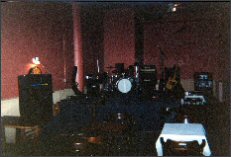
Jeff played his last gig ever at a tiny place called Barristers in Memphis. 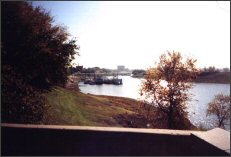
On May 29th, 1997, at around 9:00 p.m. Buckley and Keith Foti jumped this wall near the Wolf Marina and set themselves up on the banks of the Mississippi River with a boombox. 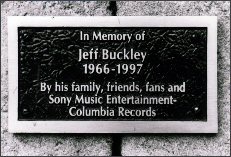
A memorial was erected at the Memphis Zoo, a place Jeff loved and was
going to work, in memory of him and his music.
|
Jeffrey Scott Buckley was born in California's Orange County on November 17, 1966 and died in a tragic drowning accident in Memphis, Tennessee on May 29, 1997. On a visit to the Wolf River with a friend, Jeff decided to jump in fully clothed and go swimming. As he drifted farther from shore he was suddenly and silently pulled under the waves by the undertow of a passing tugboat. Jeff was missing for three days before his body was spotted by a tourist on June 4th and recovered at the bottom of Beale Street, the legendary birthplace of the Blues. It was on this same evening that his band had arrived in Memphis from New York to start recording Jeff's second album My Sweetheart the Drunk. The only son of Tim Buckley and Mary Guibert, he was raised by Mary and his stepfather Ron Moorehead. As a kid Jeff was known by the name Scotty Moorehead. When Jeff was 8 years old he finally got to meet his real father, Tim Buckley, and spend some quality time with him. This was the only time Jeff would ever spend with Tim, as he tragically passed away shortly after at age 28. After hanging out with his dad, Jeff decided to change his name from Moorehead back to Buckley. Jeff grew up listening to hard rock and to folk rockers such as Led Zepplin, Rush, Genesis, Bob Dylan, Joni Mitchell and Van Morrison. The first LP he ever owned was Led Zeppelin's "Physical Graffiti", and he stated that one of his favorite albums was "Hemispheres" by the progressive rock band Rush. After moving to different places countless times with his mother, which you you can read about in the excellent biography Dream Brother by David Browne, he stayed in Los Angeles and let her move on without him. While Jeff was there he completed a two-year course at the Musicians' Institute. Buckley often called his time at the Institute a "waste," yet he made life-long friends there. He then played in a number of bands in Los Angeles. Group Therapy was his first major band, and he was also in a short-lived reggae outfit called Shinehead. He played in a various number of other bands in which he usually only played guitar. He had yet to reveal his magnificent voice even to bandmates. Buckley had a demo tape that he called The Babylon Dungeon Demos featuring early works and versions of songs that would appear on Grace. This demo was shopped around to various people but never turned up anything. In 1990 Buckley was invited to New York to perform with others at the Tim Buckley Tribute Concert held at St. Ann's Church in Brooklyn. It was here that he first met Gods and Monsters guitarist Gary Lucas who was also performing at the tribute. After coming back to Los Angeles he realized his heart was in New York, so he sold everything he owned and moved back the same year. Buckley ended up joining Gods and Monsters with Gary Lucas and was a part of the band for two years. Becoming frustrated with the band, and the desire to do his own thing, he quit the band and embarked on a solo career. Jeff played mostly cover songs in East Village clubs with his blonde Fender Telecaster, which was loaned to him by Janine Nichols, the artistic director of the Tim Buckley Tribute he had performed at a year earlier. His name grew prominent primarily through word of mouth, and he soon found himself singing to Columbia Records. One of these performances, at the St. Mark's Place Irish coffee house Sin-é (pronounced Shin-ay), was immortalized on Live at Sin-é after Buckley was noticed by Columbia Records executives, who signed him in 1992. He had emerged in New York City's avant-garde club scene in the 1990's as one of the most remarkable musical artists of his generation, acclaimed by audiences, critics, and fellow musicians alike. His first commercial recording, the four-song EP Live At Sin-é, was released in December 1993 on Columbia Records. The EP captured Buckley, accompanying himself on electric guitar, at the tiny coffeehouse Sin-é in New York's East Village, the neighborhood he'd made his home. During the fall of 1993, prior to the release of Live At Sin-é, Buckley entered the studio with his band, Mick Grondahl (bass) and Matt Johnson (drums), and producer Andy Wallace to begin recording the seven original songs (Mojo Pin, Grace, Last Goodbye, So Real, Lover, You Should Have Come Over, Eternal Life, Dream Brother) and three covers (Nina Simone's Lilac Wine, Leonard Cohen's Hallelujah, Benjamin Britten's Corpus Christi Carol) that comprise his debut album Grace. Guitarist Michael Tighe, who co-wrote and performed on Grace's So Real, joined Buckley's ensemble shortly thereafter as a permanent member. In early 1994, not long after Live At Sin-é appeared in stores, Jeff Buckley toured clubs, lounges, and coffeehouses in North America as a solo artist from January 15-March 5 as well as in Europe from March 11-22. Following extensive rehearsals in April-May 1994, Buckley's Peyote Radio Theatre Tour found him on the road with his band from June 2-August 16. His full-length full-band album, Grace, was released in the United States on August 23, 1994, the same day Buckley and band kicked off a European tour in Dublin, Ireland; the 1994 European Tour ran through September 22, with Buckley and Ensemble performing at the CMJ convention at New York's Supper Club on September 24. The group headed back into America's clublands for a Fall Tour lasting from October 19-December 18. On New Year's Eve 1994-95, Buckley returned to Sin-é to perform a solo set; on New Year's Day, he read an original poem at the annual St. Mark's Church Marathon Poetry Reading. Two weeks later, he and his band were back in Europe for gigs in Dublin, Bristol, and London before launching an extensive tour of Japan, France, Germany, Italy, Holland, Belgium, and the United Kingdom which lasted from January 29-March 5. On April 13 1995, it was announced that Jeff Buckley's Grace had earned him France's prestigious "Gran Prix International Du Disque -- Academie Charles CROS -- 1995"; an award given by a jury of producers, journalists, the president of France Culture, and music industry professionals, it had previously been given to Edith Piaf, Jacques Brel, Yves Montand, Georges Brassens, Bruce Springsteen, Leonard Cohen, Bob Dylan, Joan Baez, and Joni Mitchell, among other musical luminaries. France also awarded Buckley a gold record certification for Grace. From March 5 through April 20, Buckley and his band rehearsed for an American spring tour with gigs running from April 22-June 2. From June through August, Jeff and company toured the United Kingdom, France, Denmark, Belgium, Germany, the Netherlands, Italy, and Switzerland. The band took off for Down Under to play six Australian shows between August 28-September 6, 1995. In November 1995, Buckley played two unannounced solo shows at Sin-é. He performed songs including the new "Woke Up In A Strange Place" on Vin Scelsa's Idiot's Delight show on WXRK-FM on December 17 and celebrated New Year's Eve 1995-96 with performances at New York's Mercury Lounge and Sin-é. Jeff Buckley and his touring ensemble went back to Australia, where Grace had earned a gold record certification, for the "Hard Luck Tour," which ran from February 9-March 1 of 1996. Drummer Matt Johnson left the group after the final Australian show. The posthumous album Mystery White Boy brings together some of the high points from Jeff's 1995-1996 live performances. The DVD/home video release of Jeff Buckley :: Live In Chicago documents, in its entirety, Jeff's concert at The Cabaret Metro in Chicago on May 13, 1995. In May of '96, Jeff played four gigs as a bass player with Mind Science of the Mind, a side-project of Buckley's friend, Nathan Larson of Shudder To Think. In September '96, Buckley played another unannounced solo gig at his old favorite haunt Sin-é. December of 1996 found Jeff Buckley embarking on his "phantom solo tour"; designed to experiment with new songs in a live setting (as in his Sin-é days), these unannounced solo gigs throughout the Northeast U.S. were played under a succession of aliases: the Crackrobats, Possessed By Elves, Father Demo, Smackrobiotic, the Halfspeeds, Crit Club, Topless America, Martha & the Nicotines, and A Puppet Show Named Julio. At midnight on February 9, 1997, Jeff Buckley debuted his new drummer, Parker Kindred, in a show at Arlene's Grocery on New York's Lower East Side. He also played a couple of solo gigs in New York during the first months of 1997: a gig at the Daydream Cafe (featuring band members Mick Grondahl and Michael Tighe as "special guests") and a solo performance February 4 as part of the Knitting Factory's 10-Year Birthday Party. Buckley and his band had recorded intermittently -- with Tom Verlaine as producer -- during Summer/Fall 1996 and early winter 1997 in New York and in February 1997 in Memphis. After the conclusion of those sessions, Jeff sent the band back to New York while, during March and April 1997, he remained in Memphis and continued to craft his work-in-progress, making various four-track home recordings of songs to present to his bandmates. Some of these were revisions of the songs recorded with Verlaine, some were brand new compositions, and some were surprising cover versions. The new lineup debuted Buckley's new songs at Barrister's in Memphis on February 12 and 13. Beginning March 31, Jeff began a series of regularly scheduled Monday night solo performances at Barrister's. His last show there was on Monday, May 26, 1997. The night Buckley died, he was on his way to meet his band to begin three weeks of rehearsals for My Sweetheart, The Drunk; producer Andy Wallace, who'd helmed the boards on Grace, was to join them in Memphis in late June to record his new album. Jeff's disappearance appears to be the result of swimming in a dangerous section of water that joins Memphis with the Mississippi River. Jeff and a friend, Keith Foti, were on their way to a local rehearsal studio where Jeff and his band were preparing to record a new album. After getting something to eat at Memphis restaurant Saigon Le, Jeff and Keith stopped at the marina, where he had gone swimming on previous occasions. In a playful mood, Jeff entered the water fully clothed while laughing and singing, wading and swimming for approximately 15 minutes. Keith remained on the shore and in visual and vocal contact with Jeff. When passing boats created waves, Keith momentarily turned away from Jeff to adjust the location of their portable radio/cassette player to prevent it from getting wet. At this point, Keith lost contact with Jeff and called out for him for 10 minutes before calling the police. Memphis authorities believe that an undertow caused by the passing boats swept Jeff away from his original location and, ultimately, underwater. Caught by the undertow of a passing tugboat, his body was recovered downstream three days later on June 4th by passengers on a steam boat. They described a body in an Altamont T-shirt, with a navel-ring, tangled up in some branches. His body was floating on the riverside near Harbor Island, at the foot of the city's famed Beale Street. In addition to his Columbia Records releases, Live At Sin-é and Grace, Jeff Buckley has appeared as a Guest Arist on several other recordings. He can be heard singing "Jolly Street," a track on the Jazz Passengers 1994 album In Love. He contributed tenor vocals to "Taipan" and "D. Popylepis," two recordings on John Zorn's Cobra Live At The Knitting Factory (1995). On Rebecca Moore's Admiral Charcoal's Song, Buckley plays electric six-string bass on "If You Please Me," "Outdoor Elevator," and "Needle Men" (on which he also plays drums). He both plays guitar and sings backup vocals on Brenda Kahn's "Faith Salons," a key track on her Destination Anywhere album (released 1996). Patti Smith's critically acclaimed Gone Again album features Buckley adding "voice" to the song "Beneath the Southern Cross" and "essrage" (a small fretless Indian stringed instrument) to "Fireflies." On kicks joy darkness, a various artists' spoken word tribute to beat poet Jack Kerouac, Jeff Buckley performed on "Angel Mine"; Jeff plays guitar, sitar, and mouth sax (adding words at the poem's conclusion) on the track. Buckley can be heard reading Edgar Allan Poe's "Ulallume - A Ballad," on Closed On Account Of Rabies (Poems & Tales by Edgar Allan Poe) on Mouth Almighty/Mercury Records. He sang "I Want Someone Badly" (Epic) for Shudder To Think's soundtrack to First Love, Last Rites. Sandy Bell, a friend of Buckley's during his L.A. days, released the resurrected track "Hollywould" in 2000, which she co-wrote and recorded with Buckley. An ardent enthusiast for a myriad of musical forms, Jeff Buckley was an early champion among young American musicians for the work of Nusrat Fateh Ali Khan, the world's foremost Qawwali (the music of the Sufis) singer. Buckley conducted an extensive interview with Nusrat in Interview magazine (January 1996) and wrote the liner notes Nusrat's The Supreme Collection album, released on Mercator/Caroline records in August 1997. On May 9, 2000, Columbia Records released Jeff Buckley-Mystery White Boy, an album of live performances, and Jeff Buckley-Live In Chicago, a full-length concert (available on DVD or VHS) recorded live at The Cabaret Metro in Chicago on May 13, 1995, in the midst of Jeff's "Mystery White Boy" tour. Following the release of Grace on August 23, 1994, Jeff and his group spent much of 1994-1996 performing around the world on the Unknown, Mystery White Boy, and Hard Luck tours. Jeff Buckley-Mystery White Boy brings together, for the first time, some of the high points of those shows. Produced by Michael Tighe (guitarist for Jeff's band throughout their international touring and the recording of Grace) and Mary Guibert (Jeff's mother) and Jeff Buckley-Mystery White Boy provides an evocative cross-section of Jeff's repertoire: previously-unreleased Buckley compositions, electrifying live interpretations of songs from Grace, and obscure and marvelous cover choices. The recordings heard on Jeff Buckley-Mystery White Boy have been hand-picked from scores of concert tapes by Mary Guibert and the members of Jeff's band who played such a large role in helping Jeff realize his musical vision. According to Mary, the tracks on Jeff Buckley-Mystery White Boy are "the individual performances that represented transcendent moments from each of the concerts we'd identified as being in the 'overall outstanding' category." "It was obvious which performances were contenders for the record," concurs Michael Tighe, "and in some cases a performance would be so supreme and unpredictable that I knew it had to be brought to the public." After his unfortunate passing a memorial ceremony was held for Jeff at St. Ann's Church on August 1st, 1997. On the stage sat an urn filled with his ashes next to the blonde Fender Telecaster that he had played so gracefully.
This is the last photo ever taken of Jeff. Jeff and tour manager Gene Bowen car shopping in Memphis hours before Jeff waded into the Wolf River. The Ryder van they were traveling to the studio and marina in can be seen in the background. 
|
